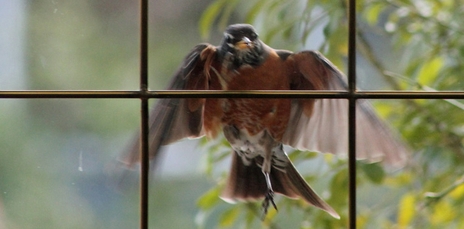Cover Windows to Minimize Appearance
When possible, use curtains, screens, awnings, or other types of window coverings to reduce the reflections in a window. This will be especially helpful during the late afternoon and evening hours when sunlight provides the harshest shine and birds are making one last trip to their favorite feeders before nightfall.
Move Your Bird Feeders Closer
If you’re worried about window strikes, we recommend you take steps to move your favorite bird feeders closer to windows. By moving feeders closer, it means a startled bird won’t be flying into a window at full speed, which limits the severity of the collision.
Distort the Reflections
Suspend branches, use bird screens, silhouette stickers, or even plastic wrap to lessen the reflections birds see in windows. The leading cause of window strikes is because of a reflected scene in the window. Birds assume that the reflection of a backyard habitat is a good source of cover when attempting to flee from predators. By breaking up the reflection seen from the outside of the window, you can help to keep wild birds safe.
Minimize Nighttime Illumination
Many wild bird species migrate during the nighttime hours to take advantage of traveling in a sky that isn’t populated with predators. With that being said, birds often mistake the warm glow of interior lighting as an attractive flight path. Reduce the distraction for your feathered friends by closing the blinds and minimizing nighttime illumination as much as possible.
Something to Think About: Sometimes Birds Attack Windows
Not all window strikes are accidental — some birds will attack windows! The Northern Cardinal is one of the primary culprits. Cardinals are notoriously territorial, and when they see their reflection in a window, they mistake it for another cardinal muscling in on its space. After a brief stare down, the real cardinal will try to attack its reflection. While these sorts of window strikes aren’t as deadly as a high-speed one, cardinals are persistent and can continue this battle for hours. The result is a very tired bird that’s left vulnerable to predators.
sources: perkypet.com






Leave A Comment